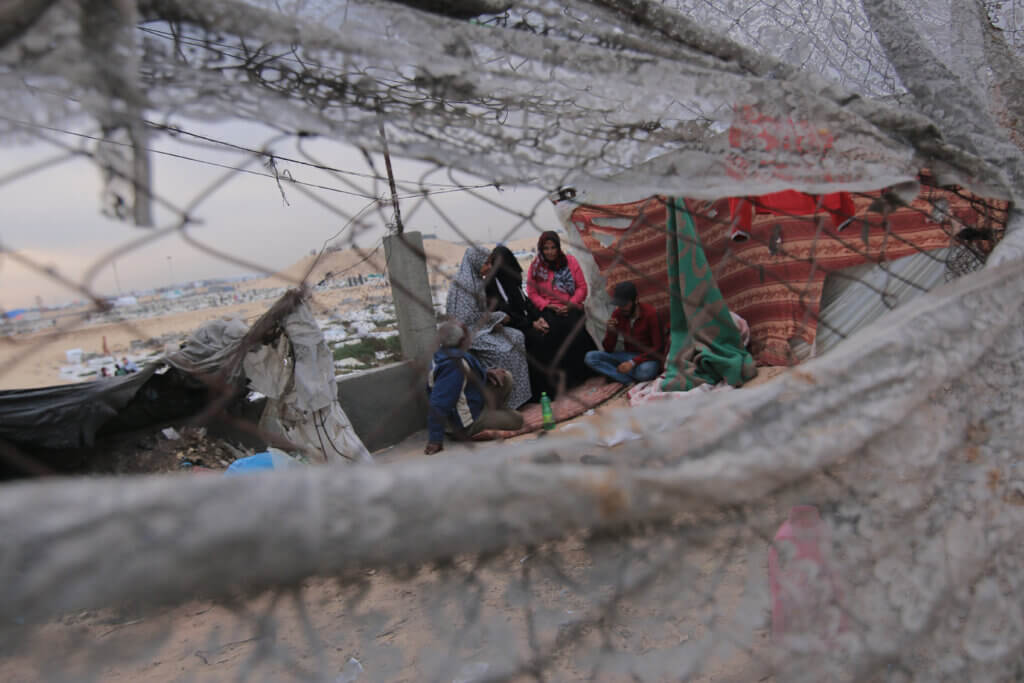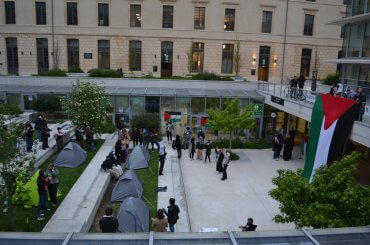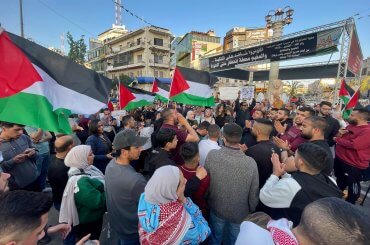In a tent opposite the bathrooms of the UNRWA school in Rafah, Nahed al-Za’im, a mother of five, sits with her sons, daughters, and grandchildren. Her husband, the sole breadwinner for the family, worked as a seller of cleaning supplies, but he lost his source of livelihood due to the Israeli aggression on the Gaza Strip.
“I cannot adequately describe my life during the Israeli aggression on Gaza, and my mind struggles to comprehend that I will spend Ramadan in displacement in an UNRWA school,” al-Za’im tells Mondoweiss.
Al-Za’im and her family were displaced from their home in the Shuja’iyya neighborhood, west of Gaza City, on October 13, after facing threats from the Israeli occupation and receiving orders for residents to relocate towards the south of the Gaza Strip.
She spent nearly three months displaced in an UNRWA school in Khan Younis. With the escalation of Israel’s bombing and shelling of the city, al-Za’im and her family were forced to relocate again. They moved through the “security” corridor set up by the Israeli army, making their way to the southernmost city in the Gaza Strip, Rafah.
“The corridor that is claimed to be safe is anything but safe,” al-Za’im explains. “We were displaced, and Israeli bombings loomed over us.”
“We are 12 people in the tent, including two children who need milk and diapers, but we cannot provide for them,” she adds. “The location of our tent is extremely unfavorable, facing the bathrooms where sewage often overflows, reaching our tent.”
With the month of Ramadan fast approaching, al-Za’im says that she feels “utterly helpless,” forced to live as a displaced refugee in a tent during a month that they have typically celebrated.
“There’s no comparison between this Ramadan and the ones before,” she says somberly. “We used to decorate our home in anticipation of the blessed month, but the occupation bombed our house, reducing it to rubble. We used to gather as a family around one table, but now we are scattered. I don’t even know the fate of my sisters and brothers. My husband — we haven’t seen him since the beginning of the Israeli aggression.”
“I feel like I’m on the brink of bursting with sadness when I think about Ramadan,” al-Za’im intimates when asked about how her family usually celebrates the holy month. “I used to prepare delicious meals for my children, such as maqluba and fatta, for when we would break our fasts. I used to prepare nutritious suhoor meals [before the beginning of the fast], but now all we have are canned foods, and in very limited quantities.”
“Even acquiring clean drinking water is a struggle,” she adds. “There’s no access to clean water, and we’re forced to drink contaminated water, which causes severe stomach pains for me and my family.”
An impending invasion
With the threat of a ground invasion of Rafah looming, over 1.5 million displaced Palestinians in the area are gripped with extreme fear and uncertainty, wondering where their next destination might be were Israel to launch its attack, as it has announced that it intends to do.
On October 13, when the Israeli military ordered residents in northern Gaza to relocate south of Wadi Gaza, thousands of families fled to the central and southern regions of the Strip in search of safety.
But to describe any area in Gaza as safe is impossible, due to the indiscriminate targeting of civilians on the part of the Israeli army, which has forced many families to be displaced more than once throughout the Strip.
The city of Rafah remains the last resort for the displaced, accommodating over a million and a half people from various areas in Gaza. Yet the Israeli bombings in the area persist in Rafah.
The fear and hysteria resulting from the Israeli threats have been exacerbated by the massacre that Israeli forces committed on February 12 in Rafah. The assault involved a relentless series of air and ground raids lasting half an hour, shaking the entire city and resulting in the deaths of over 100 civilians.
In the aftermath of this massacre, and with Israeli promises of a ground invasion by Ramadan, dozens of families have left Rafah and sought refuge in Mawasi, Khan Younis. Others fled to the city of Deir al-Balah in the Gaza Strip’s central region. Others stil chose to return to their homes in the Maghazi, Bureij, and Nuseirat refugee camps, opting to face the risk of death in their own homes or amidst the ruins of what were once their homes rather than remain in Rafah.
“If the Israeli occupation follows through with their invasion threat, we’ll be compelled to flee for the third time,” al-Za’im states. “But I have no idea where we’ll go. No place is safe.”
In the courtyard of another UNRWA school in the city of Rafah, 14-year-old Mustafa Sheikh al-Eid sits with his friend. The school teems with displaced persons, with queues forming for drinking water and others for scarce canned food.
Mustafa and his family, comprised of nine members, were displaced from their home on the eastern border of Rafah City at the onset of Israeli assault.
“I struggle to endure this existence, but I try to cope,” al-Eid explains. “Approximately forty displaced individuals share my classroom, while my mother and four sisters reside with displaced women and children in another.”
“Ramadan is drawing near, and I yearn for the simple joy of sitting with my mother, father, brothers, and sisters at one table,” al-Eid adds. “There’s nothing quite like the warmth of a family gathering during Ramadan. I worry about how we’ll observe Ramadan while displaced and under constant threat of Israeli bombardment.”
Despite Mustafa’s father’s role as an Islamic education teacher, he doesn’t receive a salary as he works as a schoolteacher at a time when all schools have been halted indefinitely. This makes providing food for his children, particularly his 3-week-old infant daughter, Hour, incredibly challenging. This is made worse by the fact that they suffer from a shortage of baby formula.
Reflecting on happier times, al-Eid reminisces on life before the war. “I’m a volleyball player, and playing with my friends after Tarawih prayers on the field was one of the highlights of our day, especially after the Iftar our fast,” he recalls. “Israeli airstrikes damaged our home. We not only prepared our house for Ramadan but also decorated the entire neighborhood. Decorating our homes and streets is a shared tradition that makes Ramadan special in Rafah.”
“I dread to think about Ramadan. Constantly consuming unhealthy food leaves me feeling weak and exhausted,” al-Eid says when asked about how his family might face Ramadan this year.
“During Ramadan, my mother used to prepare soups, salads, and a main dish for us to enjoy together. Now, we struggle to find enough food in small portions.”
In response to the occupation’s threats of a land invasion in Rafah, al-Eid resolutely declares that his family won’t move. “My family and I refuse to be displaced from Rafah. We will either stand our ground and maintain our dignity or perish here,” he declares.


